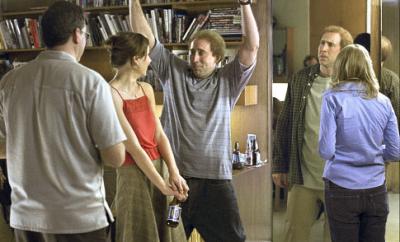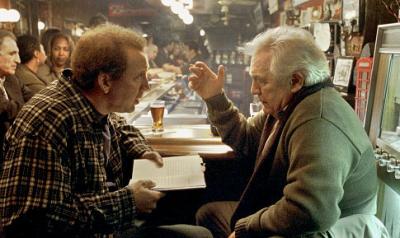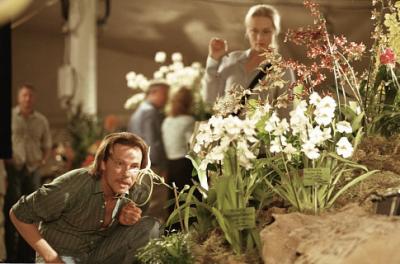Adaptation
Charlie Kaufman's head is a nice place to visit, but I wouldn't want to live there.

The main thread of the film is about Charlie Kaufman, scribe for Being John Malkovich amongst others. Here he is played by Nic Cage, in a portrayal that may or may not be near the truth, much like the entire film. He sweats profusely when in the presence of his beautiful producer Valerie (Tilda Swinton), who offers him the job of adapting a book called The Orchid Thief. He is habitually self-conscious of his appearance, continually belittling himself as being too fat and too bald. He is portrayed as overly guarded and reserved regarding his kind-of girlfriend / friend Amelia (Cara Seymour). He's a loner, tremendously non-outgoing and spends an unhealthy amount of time masturbating. Certainly a brave way to write yourself into a screenplay, but seeing as Kaufman is married with kids probably not reflective of the current state of his life. This isn't even close to being the greatest fiction in the story.
Charlie lives with his twin brother Donald, a character with no basis in reality outside of Charlie's mind. In the movie, Donald is most certainly real, being most of the things Charlie isn't, brash, slightly abrasive, outgoing, seemingly less intelligent but far more successful with the ladies and generally far, far happier with himself and his world. Being twins, he's also played by Cage, who turns in a fantastic performance, probably his best since Leaving Las Vegas. No cheap change of wigs necessary to know which one's which, Cage just nails the personalities so well that there's no need for artificial demarcations.
Now, The Orchid Thief is a real book. Written by Susan Orlean, here played by Meryl Streep. Why is it necessary to show the author? Well, Charlie wants to avoid the standard clich? laden approach to movies to more accurately reflect the heart of the novel, a simple but sprawling tale of the beauty of nature, the passion people have for life and their loves and how this relates to her. It tells the tale of John Laroche (Chris Cooper), who may at first seem like a bit of a redneck but shows himself to be intelligent, witty, quirky and above all devoted to finding and cultivating the ghost orchid. He's a terribly interesting character, and played well by Cooper. However, the book has little to no narrative. How on Earth can Charlie create something he feels is true to the book that won't involve changing it out of all recognition?

That's the question that takes up the bulk of the movie. Charlie tries to work out how to resolve this while bumbling through his own existence, now adding his own ability into the list of things he questions. Meanwhile, Donald has taken a screenwriting course from Robert McKee (Brian Cox, also terrific) and is quickly hammering out a hackneyed serial killer thriller, which his agent believes has box-office written all over it despite containing no original ideas whatsoever. This is understandably a source of frustration to Charlie. He re-reads passages of the book to try to get the feel for an approach to the film, and it's these we see acted out by Cooper and the less annoying than usual Streep. This is (possibly) a taciturn admission by Kaufman that he could not translate it adequately into a film, and this is the only way to preserve the ideals of the book. It works fairly well, Streep showing how something is missing in Orlean's life and how she perhaps hopes to love something with as much passion as Laroche loves orchids. While this is an important part of the film, being as it's what the movie was supposed to be about, it is ultimately sidelined by Charlie's own struggles and life, and perhaps some of the impact and themes of the book are lessened by the continual dipping in and out of it.
Still failing, Charlie has an idea. He starts writing a story about his inability to write a story, essentially what we've been watching up to this point. This gets him a few pages further, but hits a brick wall again. Finally breaking and consulting Donald, they decide the only way forward is to meet with Orlean herself. Charlie tries but his crippling shyness stops him from saying anything at a chance meeting in a lift. Donald has no such restraints, and organises a short interview. He grows somewhat suspicious of her answers, thinking them too well rehearsed. He doubts her claims that she is in no way romantically engaged with Laroche, and ends up convincing Charlie to start surveillance on Orlean.
As soon as Charlie lets Donald in to drive the plot, the movie descends quickly into the cheap clich? ridden tricks Hollywood churns out, and the film becomes the Hollywood blockbuster Charlie has spent the whole film railing against. In a very short space of time it goes from a character study about a fictional account of a real person trying to adapt a real novel into a fictional account of a fictional person acting out a fictional thriller story. It doesn't have quite the same head warping capacity that Being John Malkovich has, but it's terribly close.

The twins follow her back to Florida, home of Laroche and setting of the book. They find that Orlean and Laroche are indeed having an affair, at least for the purposes of the last twenty minutes if not in real life. Furthermore, the orchid hunting is little more than a front for a drug production lab. After discovering the twins snooping, Orlean decides the two cannot tell the world their story and resolves to shut them up, permanently and fatally. This results in a life and death chase through the Florida swamplands that are home to the elusive ghost orchid. While the point may be to cram in as many clich?s as possible to expose the trite and lazy films that Hollywood may churn out, that doesn't give it an excuse to suck. And suck it does, although their are flashes where we can see Charlie's pain from the ruination of the story through Cage's performance. Having said all through the film that a typical Hollywood approach to adapting this book would fail doesn't really console me after sitting through a failed approach in the last twenty minutes, I would've taken it on trust thank you so very much.
Spike Jonze directs, and those who have seen Being John Malkovich will be grateful to know that his style is every bit as captivating and attention grabbing as it was in his last film. The hypercritical might say that it's a little too similar to his first film, but that's perfectly acceptable in this case. The real star is Kaufman's screenplay, which works at many levels and is almost guaranteed to have you leaving the cinema a little puzzled as to the eventual theme of the movie. On reflection, it can't be about a those raised by the book, as Charlie admits they just don't lend themselves to cinematic interpretation.
So it's a satire on the creative process and the Hollywood script factory, churning out hundreds of identikit movies a year. But how much of that is accurate? Given the fictional accounts of his personal life and the fictional person of Donald, how much of the truth is Charlie telling us? It seems to ring true, but the only person likely to know is Kaufman himself. The important thing for us, I suppose, is that it's tremendously entertaining, superbly written and well acted by everyone involved. Some may find the script narcissistic and self-indulgent, as indeed Charlie/Cage recognises and worries about this. Thankfully I didn't, as that would entirely spoil the flick. I was amused throughout, and found it pleasantly thought provoking. The final act was the only disappointment for me, smacking terribly of the 'post-modern-ironic', winking-at-the-camera approach seen all too often these days. While this may be to emphasise Charlie's views of the hackneyed scripts prevalent today, I found it mildly irritating. Unless, of course, his intention was to satirise the 'post-modern-ironic', winking-at-the-camera approach seen all too often these days, in which case won't I look quite the chump.
Were I in the business of passing quantifiable judgements, I'd award this 4/5 TippyMarks.
Meryl Streep (Susan Orlean)
Chris Cooper (John Laroche)